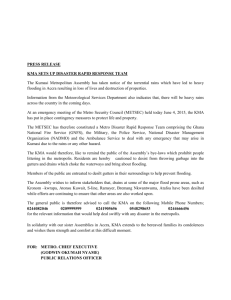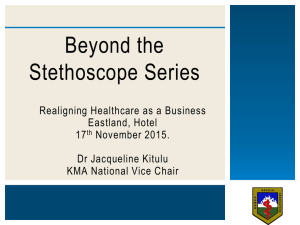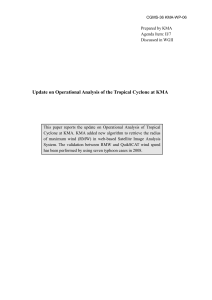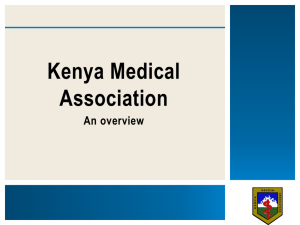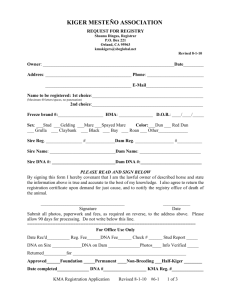Design REQUIREMENTS - Kessler McGuinness & Associates
advertisement
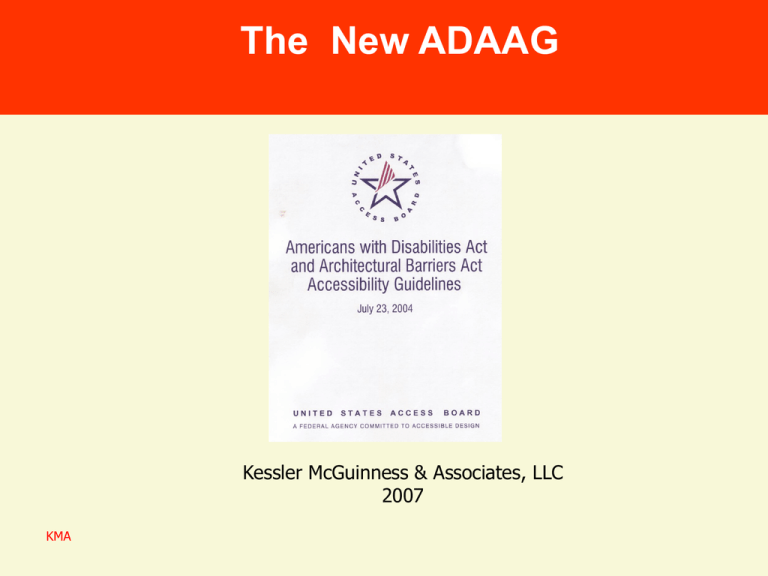
The New ADAAG Kessler McGuinness & Associates, LLC 2007 KMA KMA Provide public and private entities with consulting services related to accessibility and Universal Design • • • • • • • • • • • • KMA DOJ U.S. Access Board Architects Massport San Diego Internt’l Airport San Francisco Internt’l Airport Portland (OR) Internt’l Airport Dallas Area Rapid Transit SE Pennsylvania Transit Auth. Atlanta Housing Auth. CUNY Tufts University • • • • • • • • • • • • Fidelity Properties John Hancock Equity Office Equity Residential IBM/Lotus Harvard Univ. M.I.T. Talbots Au Bon Pain Archstone Smith Berklee College of Music Lincoln Property Purpose The New (2004) ADAAG • What is it? • What should you do with it? KMA Agenda • Regulatory Context • Standards v. Guidelines • Revised ADAAG – Format & Organization – Scoping & Technical Requirements • Key Issues • When To Use The Revised ADAAG? • Q&A KMA PRE-TEST KMA Why Accessibility People with Disabilities – 19.4% or 49 million people in the U.S. – 24.1 million have a severe disability Demographics of Aging – 34.7 million people 65+ – Will double over the next 25 years – Disabilities increase with age “They” are “We” KMA Regulatory Context • • • • • • • Penicillin Architectural Barriers Act 1968 Fair Housing Act 1968, 1988 Section 504 1973 Air Carriers Access Act 1988 Americans with Disabilities Act 1990 Mass. Architectural Access Board MAAB 1968 • State & Local Anti-Discrimination Laws ABA KMA Architectural Barriers Act (ABA) • Designed, altered, leased with federal funds • UFAS current standard – Uniform Federal Accessibility Standards • New ADA-ABA Guidelines – The Americans with Disabilities Act and Architectural Barriers Act Guidelines “The New ADAAG” KMA Americans with Disabilities Act Public Law 101-336 Broad prohibition against discrimination based on disability • TITLE I - Employment • TITLE II - Activities operated by state or local governments, including housing • TITLE III – Commercial Facilities & Places of Public Accommodation KMA ADA – Civil Rights • …discrimination for purposes of <the ADA) includes a failure to design and construct facilities … that are readily accessible to and useable by individuals with disabilities. • Door Knob = Discrimination • Proactive barrier removal requirements = Affirmative Action KMA ADAAG - Looks like a building code…but isn’t Applies to all facility types except some housing Minimum standard Does not necessarily insure compliance with the law KMA ADA Accessible Design Standard Law Implementing Regulations ADAAG (guidelines) Adopted by US DoJ ADA Standards (enforceable) KMA ADA Design Standard v. ADAAG • Current Design Standard (ADAAG 1992) • ADAAG (2002) – – – – State and local government facilities Building elements designed for children’s use Play areas Recreation facilities • ADA-ABA Guidelines (2004) • More ADAAG to Come: – Public Rights-Of-Way – Developed Outdoor Areas KMA Final Rule 36 CFR Parts 1190 & 1191 ADA Accessibility Guidelines for Buildings and Facilities; Architectural Barriers Act (ABA) Accessibility Guidelines; Final Rule (An enforceable guideline for DoT, GSA & USPS projects) KMA Revised ADAAG - Background • Decade-long review • Advisory committee – Format and usability – Reconciling with model codes – Consistent ADA/ABA requirements – Updating requirements • Proposed rule • Public comment • Final Rule 7/2004 KMA What’s Different? • New Organization & Format • New Scoping & Technical Requirements • Harmonizes & References Model Building Codes* KMA Organization & Format • New numbering system consistent with model codes • Clear delineation between scoping and technical provisions • New figures and commentary • Non-mandatory language -advisory information • All figure-based information in written text • Integrate special occupancy chapters (medical, libraries, transient lodging..) KMA Rule in Three Parts* Technical Chapters (Part III) ADA Scoping (Chapter I) KMA ABA Scoping (Chapter II) Advisory Material Clarifications & Recommendations* KMA ADA CHAPTER 1: APPLICATION AND ADMINISTRATION • Equivalent Facilitation • Tolerances • Percentages KMA ADA CHAPTER 2: SCOPING REQUIREMENTS KMA Press Boxes New exception: • 500 sq ft or less (aggregate area) AND • On bleachers entered on one level Or • Free standing – elevated 12’-0” or more •521 CMR still requires all press boxes to be accessible KMA Accessible Means of Egress References International Building Code (IBC) Amendments to 521 CMR are more stringent 20.11.1 - ALL SPACES OR ELEMENTS REQUIRED TO BE ACCESSIBLE BY 521 CMR SHALL BE PROVIDED WITH NO LESS THAN ONE ACCESSIBLE MEANS OF EGRESS. A. WHERE MORE THAN ONE MEANS OF EGRESS IS REQUIRED UNDER 780 CMR (THE STATE BUILDING CODE) FROM ANY ACCESSIBLE SPACE OR ELEMENT, EACH SPACE OR ELEMENT SHALL BE SERVED BY NOT LESS THAN TWO ACCESSIBLE MEANS OF EGRESS. KMA Exterior Egress 20.11.2 – THE EXIT DISCHARGE SHALL PROVIDE A CONTINUOUS PATH OF TRAVEL FROM AN EXIT TO A PUBLIC WAY BY MEANS OF A WALKWAY OR A RAMP. A. WHERE PUBLIC WAYS ARE FURTHER THAN 100 FEET FROM AN EXIT, EXTERIOR AREAS OF RESCUE ASSISTANCE …….NO CLOSER THAN 100 FEET FROM THE BUILDING. B. IN BUILDINGS WHERE THE GRADE AT THE LEVEL OF EXIT DISCHARGE PROHIBITS CONSTRUCTION OF EITHER A WALKWAY OR A RAMP, A PORTION OF AN EXTERIOR EXIT BALCONY LOCATED IMMEDIATELY ADJACENT TO AN EMERGENCY EXIT COMPLYING WITH 20.12.2 MAY BE CONSTRUCTED AS AN AREA OF RESCUE ASSISTANCE. KMA Employee Work Area • ALL – Access to egress • ADA – >1000 sq.ft. - must have accessible common use circulation paths (206.2.8) • ABA – Full access in employee work areas • 521 CMR – No jurisdiction over employee-only areas KMA Entrances • ADA & ABA – 60% (v. 50%) must be accessible • 521 CMR – ALL public entrances accessible KMA LULA/LIFTS Allowed in limited circumstances – – – – – – – KMA Performance area/speakers’ platforms Wheelchair spaces Judicial spaces Incidental spaces Amusement rides Team/player seating When elevator not required Van Accessible Spaces 1 of 6 (v. 8) KMA Single-User Toilet Rooms • ADA & ABA – Where grouped - 50% • 521 CMR – ALL accessible KMA Ambulatory Stalls 6+ toilets and urinals KMA TECHNICAL CHAPTERS 3 - Building Blocks Ground and floor surfaces (302), changes in level (303), wheelchair turning space (304), clear floor space (305), knee and toe clearances (306), protruding objects (307), reach ranges (308), and operable parts 4 – Accessible Routes Walking surfaces (403), doors (404), ramps (405), curb ramps (406), elevators (407 - 409), and platform lifts (410) 5 – General Site & Building Elements Parking (502), passenger loading zones (503), stairways (504), handrails (505) 6. – Plumbing Elements & Fixtures Drinking fountains (602), toilet and bathrooms (603), water closets and compartments (604), urinals (605), lavatories and sinks (606), bathtubs (607), showers (608), grab bars (609), tub and shower seats (610), washing machines and clothes dryers (611), and saunas and steam rooms (612). KMA TECHNICAL CHAPTERS 7 – Communication Elements & Features Fire alarms (702), signs (703), telephones (704), detectable warnings (705), assistive listening systems (706), ATMs and fare machines (707) 8 – Special Rooms, Spaces & Elements Assembly areas (802), dressing, fitting, and locker rooms (803), kitchens and kitchenettes (804), medical care facilities (805), transient lodging (806), holding and housing cells (807), courtrooms (808), residential dwelling units (809), transportation facilities (810), and storage (811). 9 - Built-In Elements Dining and work surfaces (902), benches (903), and sales and service counters, including check-out aisles (904) 10 - Recreation Facilities Amusement rides (1002), recreational boating facilities (1003), exercise machines (1004), fishing piers and platforms (1005), golf facilities (1006), miniature golf facilities (1007), play areas (1008), swimming pools, wading pools KMA Chapter 3: Building Blocks • Forward & Side – 48” max. – 15” min. ADA & ABA more stringent than 521 CMR • KMA Knee Space • Lavatories • Counters • Fixed seating KMA Cross slope 1:48 max. KMA Tolerances 2.4.4 Tolerances on all dimensions, unless otherwise noted, shall not exceed the following: a. Dimensions between 0" and 2" inclusive, shall have a maximum tolerance of plus or minus one-eighth inch b. Dimensions more than two inches and less than 36 inches (>2" and <36" = >51mm and <914mm) shall have a maximum tolerance of plus or minus one-half inch (½" =13mm). c. Dimensions 36 inches or greater (36" or > = 914mm or >) shall have a maximum tolerance of plus or minus one inch (1" = 25mm). d. SLOPES MAY NOT EXCEED MAXIMUMS. SLOPES SHALL BE MEASURED IN TWO-FOOT INCREMENTS. KMA NOTE: Tolerances do not apply to minimums or maximums. What Can Happen KMA FHA Litigation KMA Chapter 4: Accessible Routes • ADA & ABA – Door in a recess >8” requires flush maneuvering space • 521 CMR – Door in a recess >6” requires flush maneuvering space KMA Clear Width Min. separation (48”) between reduced clear widths KMA Curb Cuts • ADA & ABA – 36” min. • 521 CMR – 48” min. KMA Ramps • Edge Protection ADA & ABA – Prevents the passage of a 4” diameter sphere 521 CMR – Edge curbs, walls, railings, or projecting surfaces that prevent people from slipping off the ramp. Edge curbs shall be min. of 2” high. KMA Detectable Warnings • New ABA/ADAAG: Not required at curb cuts on private property • Rulemaking on public rightsof-way • Required under current standard • Alternate design recognized KMA Chapter 5: General Site and Building Elements • No curbs • Mark/stripe access aisle • At least 1 for every 100’ of loading zone space provided KMA Handrails ADA & ABA – Gripping surface – more detail, more options 521 CMR – Round or oval KMA CHAPTER 6: PLUMBING ELEMENTS AND FACILITIES ADA & ABA – 16” – 18” to CL – 17” – 19” to CL 521 CMR – 18” KMA Toilets ADA & ABA • No other fixtures or obstructions shall be located within the required water closet clearance. 521 CMR • Deeper (72”) KMA Sink Knee Space • 29” apron clearance removed • The dip of the overflow is not considered in determining knee and toe clearances. KMA Accessible Drinking Fountains No parallel approach KMA Chapter 7: Communication Elements and Features • Capabilities and sound quality of assistive listening systems • ATMS - detailed criteria for audible output and tactile markings KMA Signage ADA & ABA – Mounting height: 48” – 60” specific to position of Braille characters 521 CMR – 60” mounting height to CL of sign KMA Fire Alarms NFPA 72 KMA Detectable Warnings Greater range of designs KMA Chapter 8: Special Rooms, Spaces, and Elements 802.1.4 Approach. Wheelchair spaces shall adjoin accessible routes. Accessible routes shall not overlap wheelchair spaces. KMA Companion Seating Shoulder to shoulder alignment KMA Wheelchair Spaces Over seated spectators Over standing spectators KMA Kitchens/Kitchenettes 606.2 Clear Floor Space. Forward approach, and knee and toe clearance. EXCEPTIONS: 1. A parallel approach where a cook top or conventional range is not provided KMA Chapter 10: Recreation Facilities and Play Areas KMA DOJ Questions • Effective date • Readily Achievable & Program Access KMA Use It Or Not? • What is most stringent? – Toilet CL – # van accessible parking spaces – Detectable warnings – scoping v. technical • Equivalent Facilitation • Guidance for compliance with ADA & implementing regs KMA POST-TEST KMA BSA Access Committee • Full compliance is a problem – – – – Architects Owners Contractors People with disabilities • How to make compliance easier? • Dialogue with Mass. Architectural Access Board • Bring your case studies to BSA Access Committee • DPS/AAB: Substantial Equivalency KMA www.bsa-access.org skip to main content Home | Design Standards | Resources | Training | FAQ | Gallery | The Committee | The BSA Tip of the Month May 2005 Exit signs at doors designate permanent spaces. Those signs need to be tactile and include Braille sign and be located 60" AFF on the wall adjacent to the latch side of the exit door. (ADA Standards 4.1.3(16), 4.30.1, 4.30.4-6). April 2005 Ramp slopes must not exceed 8.33% (1:12). That is the maximum steepness allowed, not a goal. Both the AAB and the ADA requires that "The least possible slope be used for a ramp." (AAB 24.2 and ADA Standards 4.8.2). March 2005 Specify flush valves on the outside or “wide side” of an accessible toilet. KMA The New ADAAG Kessler McGuinness & Associates, LLC 2007 www.kmaccess.com KMA
